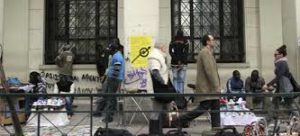Greece’s Struggle Over Academic Asylum

 The restriction of academic asylum in Greece under the new right-wing government has become – again – the epicenter of an intense debate. The debate over academic asylum has both a pretense and a rationale. The pretense is about “safety and order.” The reason is the ending of safe spaces for progressive ideas in Greek Universities, something that every reactionary government wishes to end to restrict democracy.
The restriction of academic asylum in Greece under the new right-wing government has become – again – the epicenter of an intense debate. The debate over academic asylum has both a pretense and a rationale. The pretense is about “safety and order.” The reason is the ending of safe spaces for progressive ideas in Greek Universities, something that every reactionary government wishes to end to restrict democracy.
UNIVERSITY ASYLUM IN GREECE: THE UNIVERSITY AS A PILLAR OF RESISTANCE TO THE RIGHT
Historically we have the establishment of university asylum with the establishment of the first university, 1088 in Bologna, Italy. The first wording for asylum is contained in the Authentica habita or Privilegium Scholasticum text which became law in 1155 and is the founding text for the University of the Middle Ages.
The issue of University asylum in Greece is not new. It first arose in 1859 in what came to be known as the “Skiadika”, when the army’s entry into the university was denounced in the Greek Parliament as abuse to abusing the “asylum of science” – a first reference to the disputed (then unwritten) law. In the next century, university asylum was formally recognized even under conditions that were not politically liberal. In Greece it was continuation of ancient Greek tradition: if the university is a temple of knowledge, then it can be an asylum. There were temples in Ancient Greece where everyone could get protection.
The current law is a legacy of the crackdown by the then military junta on students on Nov. 17, 1973, when a tank burst through the gates of the Athens Polytechnic, killing dozens, and leaving a deeply rooted painful national memory among Greeks toward the dictatorship – and USA’s intervention to install it. On each anniversary students march solemnly through Athens to the American Embassy with the blood-stained flag marking the day as a national memory day of the resistance to the junta. The prospect of the law being scrapped has brought some students out onto the streets.
After the restoration of democracy in July 1974, the police were forbidden to enter the university campuses and Greek universities have been largely out of bounds to police. Only the university rector had the right to call the police, and that only in cases where serious criminal activities were taking place. The thinking behind the academic asylum was the free flow of ideas and knowledge.
University asylum was legislated in 1982, a result of the student movement’s conquests and claims, although it was always challenged by the hard core nationalists, who stubbornly resisted the democratization of public life. The legislation did not, of course, prevent a few asylum violations by police bodies, some not all violent. Between 1983 and 2006 research indicated there were at least 13 police or military incursions into campus sites, 9 without the permission of the relevant university institutions (Eleftherotypia, 26.11.2006). The stormy reactions forced the governments of the time to fold, but not to abandon efforts to reduce “left-wing” inter-university “lawlessness.”
In 2007, changes were made to the law’s wording, with the concept of “asylum” and free movement of ideas replaced by “the protection of the right to knowledge, learning, work of the members of the academic community against any attempt to disrupt it.” This change enabled university authorities to dismiss asylum if student protest in universities, occupations or mobilization, “infringed on the right to work as part of a staff in the institution.” Furthermore, the asylum was limited to areas where research and training are being carried out.
During the riots of 2008, which shook Athens after the killing of Grigoropoulos by a policeman at the National Polytechnic University of Athens (NTUA), NTUA was a base of young people waging an undeclared war on the state. Despite the intensity of the clashes, the government did not allow the police to invade the NTUA in fear of escalations. “The university authorities did not call the police because they feared that the violence could escalate,” the Rector Christos Kittas then confidentially informed the US Embassy, stating that when the riots began he was threatened, “so he took this step, fearing the anarchists would unite with the demonstrators.” In one of the huge haul of diplomatic cables leaked to WikiLeaks in 2010, Daniel V. Speckhard, the former U.S. ambassador in Athens, said the law was “nothing more than a legal cover for hoodlums to wreak destruction with impunity” and “threatens the academic and student communities”. (WikiLeaks, Report No. 997, 9/6/2009). This shows the interest of the American Embassy to end the asylum right.
In 2011, Law 4009 of Anna Diamantopoulou to end university asylum passed with 255 parliamentary votes out of 300. One of the most interesting comments during the discussion of the law was made by an ultra-right wing member of the parliament that made a Gramscian-Althauserian analysis of why asylum should end. M. Voridis, an ex-fascist and anti-Semite, then member of LAOS, an ultra-right wing party, now Minister of Agriculture in the new right wing government, has reasoned the university, from its post-dictatorship era, has been a space for the dissemination and crystallization of “left” ideology, resulting in it being a dominant pillar and transmitter of anti-systemic messages to the people and the working class. As a constant unit of production and reproduction of a left-wing ‘life-world’ (in Gramscian terms), the university is, for M. Voridis, the most powerful constituent of the Left for a potential, cultural hegemony that could be conquered by building portions of the Greek people (and not just the working class) on a single, anti-system front. Vordis has made the rationale for destroying asylum explicit: “What is abolished by the bill is [what] was built by the generation of the Polytechnic, this is their defeat today, this is what we are voting for.”
University asylum was reinstated by SYRIZA and the Ministry of University under Kostas Gavroglou, reinstalling the authority of the Rector’s Board, and declaring the institution protects – in addition to academic functions – “the safeguarding of democratic values.” The law explicitly allows police to intervene, “in the case of crimes and crimes against life.” The 2017 law required unanimity of the Rector’s Council to decide, while the new law required a majority.
PRIVATIZATION AND THE CRACKDOWN ON ASYLUM
The recent emergence of asylum at the heart of Kyriakos Mitsotakis’ election campaign seems at least odd: in the four years that followed, we had neither a student-led movement nor impressive clashes between police and protesters. The bitter truth behind this attempt is that in Greece, the Constitution does not allow private Universities and this neoliberal government has pledged to change that. They know that this will lead to protests and reactions of the student movement and they are preparing the ground for a crackdown of dissident voices. What Syriza attempted, by using a left rhetoric to calm down dissident voices, for the implementation of neoliberal measures, this right wing government will continue by force. Academic asylum does not fit well with precepts of competition, the free market and profit-making.
“With a single phone call by a citizen or a student, police can enter universities campus,” Education Minister Niki Kerameos said about the hot potato of the so-called “university asylum” the new conservative government wants to abolish. This will create more chaos than ever before. One thing is sure: this winter in Greek universities will be very “hot”.
Originally posted at TeacherSolidarity.com.